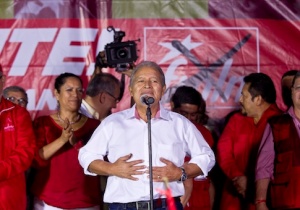 By José R. Cárdenas, in Foreign Policy
By José R. Cárdenas, in Foreign Policy
After more than two months of street protests in Venezuela, the Obama administration has placed its hopes on a spurious “dialogue” between the government and members of the organized opposition. As the Obama administration stands by, however, the chances that the crisis can lead to any positive change in Venezuela are fading.
The government and members of the opposition have just agreed to sit down for another round of negotiations, ostensibly to end the protests, which suits President Nicolás Maduro just fine. Though opposition representatives continue to plaintively seek some sort of meaningful redress for their grievances, the government has other ideas: While the talks drag on, security forces and armed militants, known as “colectivos,” wage a low-intensity war of attrition to wipe out the last of the protestors that have vexed the it since mid-February. After that, if all goes to plan, it’s back to the business of building “21st century socialism.”
So far, the negotiations have only produced nebulous agreements on a Truth Commission, improving citizen security, and returning to constitutional procedures in electing certain government officials.
That the government was intent on blocking any meaningful agreement was evident from the start. It refused to release opposition leaders who had been jailed sans due process following the outbreak of protests — including Leopoldo López of the Popular Will party — to join in the talks. The government has also dodged any responsibility for the marauding colectivos, who have been brutally attacking citizens protesting in the street. Instead, Maduro claimed the opposition was initiating the violence and his “supporters” had a right to defend themselves.
Maduro set this tone for the talks at the outset, proclaiming, “The bourgeoisie will never regain political power in the homeland.”
Certainly, the opposition is aware they are being taken for a ride. But it is not surprising that those opposition figures who are wary of confronting the regime have submitted to this political theater. The international community has been scolding them for the past decade to work within the system to effect positive political change, despite the “system” having been rigged against them in every conceivable way for 15 years, first under Hugo Chávez and now under his hand-picked successor Maduro.
What observers need to be aware of is that the opposition representatives arrayed around the negotiating table and those protesting in the streets are not one and the same. As I have written before, the protests began as spontaneous, organic eruptions of student discontent over street crime and economic hardship under chavismo. They were neither called for nor led by the organized opposition forces. As such, the latter does not have the power to turn them on or off depending on which crumbs the government decides to dole out.
All of this means that negotiations will not end Venezuela’s crisis — only real reforms will. Effective reforms would arrest the economic freefall wrought by the hare-brained statist policies of Maduro and his Cuban advisors, and re-establish credible institutions to channel discontent and foster real debate about the future of the country. The problem with that scenario is that to Maduro, all opposition is illegitimate and deserves no voice in the country’s affairs.
The Obama administration, meanwhile, has held to its position that the negotiations could actually bear fruit. In fact, it has pressed that line on Capitol Hill, stalling sanctions legislation in both the House and Senate that could “upset” the negotiating process.
The irony, of course, is that pressure from sanctions is the only way the Venezuelan government will enact meaningful change. It has paid no price for unleashing its paramilitary thugs against protestors, so why would it alter its approach? Either we care what happens in Venezuela, or we don’t. If we do, then at least let’s act like it.








